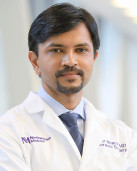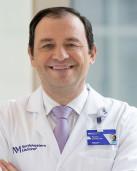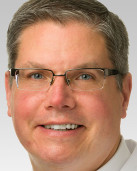
Dr. Ankit Bharat
Corresponding author
professor of thoracic surgery at Northwestern University Feinberg School of Medicine and executive director of the Northwestern Medicine Canning Thoracic Institute
Expanding universal age-based screening could prevent more than 26,000 extra deaths yearly
CHICAGO --- In a new study of nearly 1,000 consecutive patients treated for lung cancer at Northwestern Medicine, researchers discovered only 35% would have qualified for screening according to the U.S. Preventive Services Task Force (USPSTF) screening criteria. The two-thirds of patients who would have been excluded were disproportionately women and never-smokers.
Currently, USPSTF recommends annual lung cancer screenings for adults ages 50-80 who have a 20 pack-year smoking history (the equivalent of one pack of cigarettes a day for 20 years, or two packs a day for 10 years) and currently smoke or have quit within the past 15 years – a narrow window that excludes many vulnerable individuals.
In the new study, which will be published Nov. 21 in JAMA Network Open, Northwestern Medicine researchers recommend expanding the universal age-based screening to 40-85. They estimate this would detect 94% of lung cancers, preventing more than 26,000 extra deaths annually. The research also demonstrates that such screening would be remarkably cost-effective, with the minimal risks from radiation exposure or biopsies far outweighed by the potential to save lives.
Lung cancer remains America’s deadliest cancer, claiming more lives than breast, colon and prostate cancers combined, accounting for one in every five cancer deaths among both men and women. The disease is particularly insidious: Nearly 80% of cases aren’t discovered until they’ve reached advanced stages, largely because symptoms rarely appear until it’s too late. The widespread misconception that only smokers develop lung cancer, combined with limited screening access for those without tobacco history, contributes to these devastating statistics. Researchers at the Canning Thoracic Institute predict that a universal age-based screening (40-85) could enhance detection, improve cost-effectiveness and address health inequities.
“Nearly six years after the pandemic’s start, we’re seeing increasing numbers of patients with lung scarring and fibrosis from COVID-19, especially those who get reinfected with respiratory viruses,” Bharat said. “The damage compounds with each infection. Early detection through comprehensive screening can help us intervene before these conditions progress to requiring transplantation.”
The Lung Health Center addresses multiple health concerns simultaneously. Beyond respiratory conditions, the screening can detect coronary calcium deposits that indicate cardiovascular risk and can identify early signs of osteoporosis, which is particularly important for women’s health. Currently, cardiovascular disease remains the leading cause of non-cancer deaths nationally, while lung disease, including cancer, represents the top cancer-related mortality for both men and women.
“This initiative transforms how we approach chest health comprehensively,” said Dr. Momen Wahidi, professor of pulmonary and critical care medicine at Feinberg and an interventional pulmonologist and medical director of the Canning Thoracic Institute. “Instead of waiting for symptoms to appear, we’re giving patients and physicians a complete picture of chest health that can guide preventive care across multiple specialties.”
The center particularly encourages screening for individuals who may have sustained lung damage from various sources:
“We’re seeing younger patients with respiratory problems from vaping, environmental exposures and COVID-19 who would never qualify for traditional screening,” said Dr. Scott Budinger, chief of pulmonary and critical care at Feinberg and the Canning Thoracic Institute. “This lung screening approach allows us to catch interstitial lung disease, pulmonary fibrosis, lung cancer and other conditions years before they’d typically be diagnosed.”
Credit: Northwestern Medicine

Corresponding author
professor of thoracic surgery at Northwestern University Feinberg School of Medicine and executive director of the Northwestern Medicine Canning Thoracic Institute

, professor of pulmonary and critical care medicine at Northwestern University Feinberg School of Medicine and an interventional pulmonologist and medical director of the Canning Thoracic Institute

Chief of pulmonary and critical care at Northwestern University Feinberg School of Medicine and the Canning Thoracic Institute